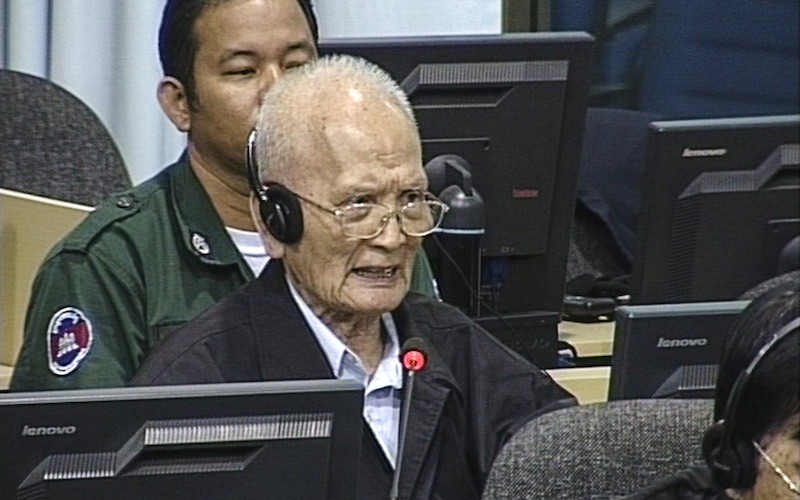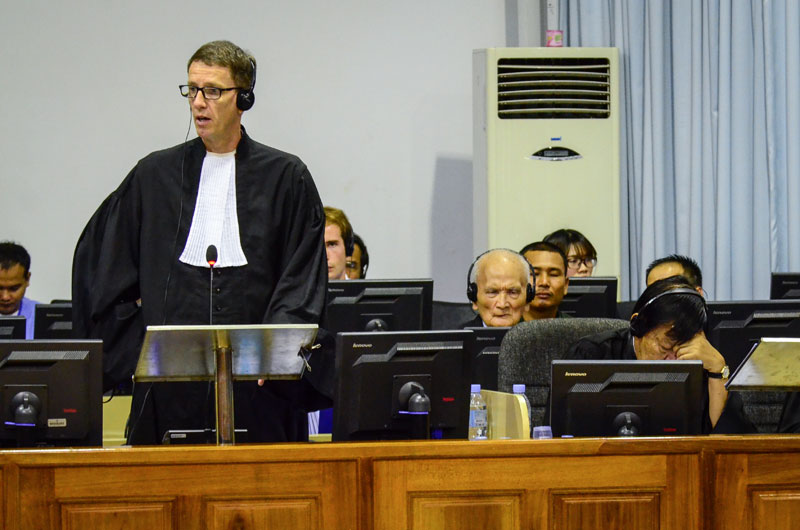The second trial of the two highest-ranking surviving Khmer Rouge leaders was a biased, “disheartening sham” rife with political interference that stood in the way of ascertaining the truth, argues the closing brief in the defense of Nuon Chea, the regime’s second-in-command.
Scathing, fierce and at times sarcastic, the mammoth 550-page confidential document, which The Cambodia Daily obtained this week, lambasts the court for what it describes as its “blatant disinterest in the truth” and lets few of those connected to the prosecution off the hook.

The brief describes the international judges as biased, incompetent and dumb. Some witnesses are accused of recalling “false memories” or offering “knowingly baseless claims.” The whole process is recounted as a deliberate reinforcing of a reductionist historical narrative of “Good versus Evil.”
Nuon Chea’s international lawyer, Victor Koppe, and his Cambodian counterpart, Son Arun, use the closing brief to highlight what they perceive as widespread political interference at the court.
The brief criticizes the Trial Chamber’s refusal to summon National Assembly President Heng Samrin—a former Khmer Rouge commander—and its failure to admit a Human Rights Watch (HRW) report that accuses Prime Minister Hun Sen of being involved in crushing a rebellion of Cham Muslims during his time with the communists.
It reveals, for the first time, that the Trial Chamber this year prohibited the Nuon Chea defense from playing a 2008 recording of an interview with Mr. Samrin, conducted by U.K. filmmaker Rob Lemkin and Cambodian journalist Thet Sambath, in which the former Khmer Rouge commander speaks sympathetically of Nuon Chea.
“Consistent with Nuon Chea’s own account of his relationship with Heng Samrin, Heng Samrin said that he was ‘close to Nuon Chea’ and that they ‘used to live, walk and sleep together,’” it says.
“He describes Nuon Chea as ‘good, fair, polite and loyal’ and said that ‘Khieu Samphan was also good…but he was powerless,’” it adds, in reference to the regime’s former head of state who is on trial alongside Nuon Chea for a wide range of crimes including genocide.
The brief concedes, however, that Mr. Samrin says he believes it was right that Nuon Chea was prosecuted.
“This interview’s importance and relevance is especially pronounced given that the national judges accused the Defence of requesting to hear Heng Samrin as character witness ‘to generate controversy’ and as mere ‘trial tactics,’” it states.“This was obviously never the case as the interview clearly proves.”
The failure of the court to admit HRW’s “30 Years of Hun Sen,” which accuses Mr. Hun Sen’s regiment of being involved in a deadly attack on Cham Muslims in Kompong Cham province, is raised as an example of double standards in the sources the prosecution and the defense could call upon.
“This double standard was equally apparent in the Chamber’s spurious reasons refusing a Defence request to reconsider admitting the Human Rights Watch report ‘30 Years of Hun Sen’ into evidence, widely known to have been written by ‘Mr. Khmer Rouge Tribunal’ himself, Stephen Heder,” it states. Heder is a renowned Khmer Rouge historian.

“As is well known considering the report’s prominent public profile, Human Rights Watch details Hun Sen’s involvement in the CPK [Communist Party of Kampuchea], including in violently suppressing Cham rebellions in 1975,” it adds, branding the decision “baffling.”
The brief then says the decision to omit the Kroch Chhmar Security Center in Kompong Cham province from the scope of the trial was “just another attempt to pivot away from any possible incrimination of current government officials” including Mr. Hun Sen, Mr. Samrin and CPP senator Ouk Bunchhoeun, who was then deputy secretary of the sector where the center was located.
Bias
Along with accusing the court of wilting in the face of politically sensitive evidence, Nuon Chea’s lawyers also accuse the Trial Chamber judges of harboring an inherent bias against their client.
While Mr. Koppe’s wrath was usually aimed at Judge Jean-Marc Lavergne (the Dutch lawyer was referred to the Amsterdam Bar Association last year for saying the French judge was “the ultimate combination of bias, incompetence and dumbness”), the closing brief mainly takes aim at Judge Claudia Fenz.
The lawyers cite a 2010 interview with Austrian newspaper Wiener Zeitung, in which Judge Fenz drew analogies between the Nazis and the Pol Pot regime, and referred to Kaing Guek Eav, alias Duch, who was the first Khmer Rouge official to be found guilty at the court, as “the leader of an extermination camp.”
“Not only does her likening of S-21 to Auschwitz highlight the success of Vietnamese and [People’s Republic of Kampuchea] propaganda in falsely-equating S-21 with the Nazis’ Auschwitz extermination camp, but considering that Judge Fenz is Austrian, and should be very familiar with the true nature of Nazi Germany, such a ridiculous and reductionist view is absolutely unforgivable,” the brief argues. “Clearly the Chamber, and at least Judge Fenz, have long made up their minds in this regard,” it adds.
Repeating Mr. Koppe’s personal attack on Judge Lavergne that had him referred to his bar, it then asks “whether the U.N. could not have found anyone else in the world to adjudicate its trials.”
‘Paranoid Narrative’
Responding to the Nuon Chea brief, international co-prosecutor Nicholas Koumjian said the closing arguments simply regurgitated the same account that the Khmer Rouge leadership had been peddling since its overthrow.
“Nuon Chea’s claims just repeat the same failed paranoid narrative that the Khmer Rouge leaders have been trying to sell since they were in power,” Mr. Koumjian said in an email. “Nuon Chea ‘makes no apology for S-21,’ claims that there is nothing wrong with killing people with NO TRIAL as long as the Khmer Rouge leaders suspected they were disloyal, claims no policy of forced marriages, Buddhists were not persecuted and working and living conditions were not inhumane,” he added. “Those claims are patently false, were disproved by the evidence and certainly are not going to fool the millions of Cambodians still alive who lived through that regime.”
Manichean Narrative
Nuon Chea’s lawyers argue the Trial Chamber has committed itself to “the Manichean Narrative”—reducing history into a basic “Good versus Evil” narrative—rather than seeking the truth.
The lawyers accuse “the Vietnamese and their collaborators-turned People’s Republic of Kampuchea officials”—who ruled Cambodia after overthrowing the Khmer Rouge—of being the source of this effort to “reframe history” by exaggerating the crimes of Democratic Kampuchea (DK), calling it the “precursor to today’s ‘fake news.’”
It cites prominent historian David Chandler acknowledging that the Vietnamese-backed regime exaggerated Khmer Rouge’s atrocities in order to divert attention from the newly installed leaders, who were former members of the CPK.
“While the new government based its legitimacy on the fact that it had come to power by toppling the Khmer Rouge, it was in no position to condemn the entire Movement since so many prominent PRK figures had been Khmer Rouge themselves until they defected to Vietnam in 1977 and 1978,” Mr. Chandler wrote.
As a result, people were encouraged to focus their anger on the “genocidal clique” that had governed the country between 1975 and 1979, he added. Academics and the media have only bolstered this narrative, the lawyers claim, through a lack of critical analysis of the widely accepted history of the period.
“Much like a Donald Trump tweet, material that feeds the Manichean narrative often not only escapes scrutiny but is bolstered courtesy of media attention. The media and the Manichean narrative enjoy a symbiotic relationship, feeding off and into each other,” the statement says. “Such blind acceptance is also apparent in Cambodian media today, as seen in the uncritical, star-struck reaction to Angelina Jolie and Rithy Panh’s new film ‘First They Killed My Father,’” it adds. “The Defence does not comment on the veracity of then-five year old Loung Ung’s (also upper-class Cambodian) account and its cinematic depiction. It simply signals an urgent need to remain critical,” it adds.
Collective Memory
The narrative of what occurred during the Pol Pot regime has been further reframed by a sense of “collective memory” among survivors in Cambodia, the brief claims.
The lawyers cite academic Nancy Combs—whom the court refused to summon—who argues that witnesses’ memories can become distorted through the “introduction of post-event information.”
“This is particularly so at international tribunals where significant time may pass between events and trial; where events may be subject to post-event discussion and where ‘the entire community has information to share about the crimes,’” it says.
Civil parties—survivors deemed to have been subjected to exceptional harm who can appeal for reparations—are most susceptible to this, the lawyers claim, especially due to the fact they do not testify under oath.
“They participate collectively since they are mostly organised into large groups that share common lawyers and, in light of the testifying opportunities, nominate single civil parties to represent each group’s experiences in court,” it states. “The Supreme Court Chamber highlighted the resultant weaknesses in civil party evidence, explaining that most civil party applications and victim complaint forms might in fact “represent ‘collective memory’ or ‘common narrative’ rather than personal experiences,” it adds.
It also cites what it calls “mythological accepted truths” in the courtroom—including the smashing of babies against trees and the consumption of human organs—as evidence of this in action among witnesses, civil parties and experts.
“However, as discussed in this Brief, at trial, such ‘accepted truths’ buckled under testing and revealed themselves at best as false memories and at worst, knowingly baseless claims,” it claims.
The brief ends by arguing that it “has not been proven beyond reasonable doubt that Nuon Chea is guilty of any of the crimes pursuant to any of the modes of liability with which he has been charged in the Closing Order in Case 002/02” and calls for his acquittal for all crimes.
The closing briefs for the prosecution, civil parties and defense teams are expected to be made public next week, while final oral submissions take place in court next month.
A verdict is expected toward the end of the year.



